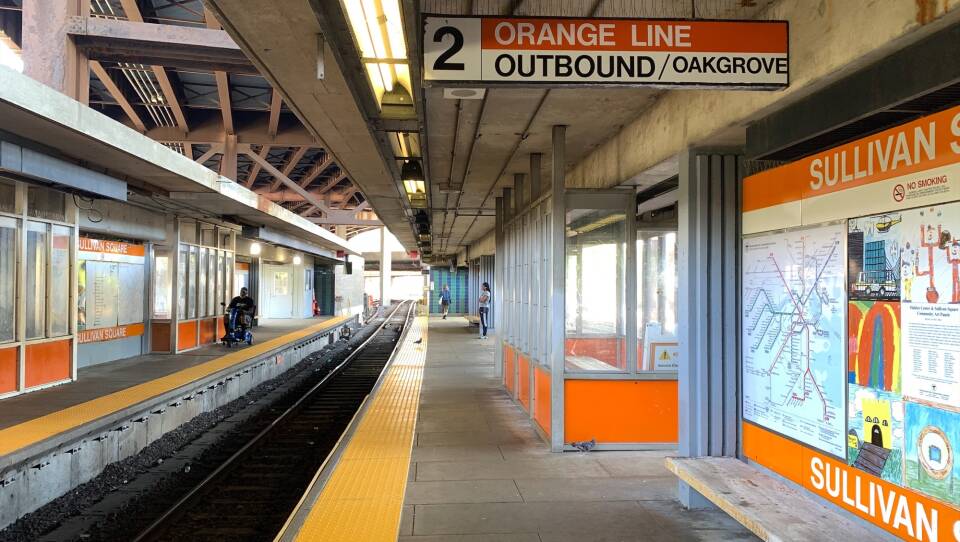On Aug.19, a little over a week from today, the monthlong shutdown of the MBTA’s Orange Line will begin. Just a few days after that, on Aug. 22, the new Green Line extension will close for two weeks as well. A mix of shuttle buses and increased commuter rail service is being deployed to help passengers get around, but shuttle routes have not been finalized and communication has been contradictory and confusing. Somerville Mayor Katjana Ballantyne joined GBH’s Morning Edition hosts Jeremy Siegel and Paris Alston to talk about how the shutdowns will affect her city. This transcript has been lightly edited.
Paris Alston: Mayor Ballantyne, when you first learned about these shutdowns, what came to mind for you?
Mayor Katjana Ballantyne: What came to mind for me was [what] the disruption was going to cause in the daily lives of everybody. And in our community, I would also say that it made me think of the big picture and what this means for our region. Good public transit is a benefit to everyone in the region because it has the potential to touch so many people in positive ways. It's good for economic justice, it's good for environmental justice, it's good for everyone. We have the potential in Massachusetts to have a great public transit system and we have to get it right. And obviously, lately, with a lack of real political leadership, we haven't gotten it right. And Somerville is going to be hit hard by both the Orange and the Green Line closures.
More Local News
Jeremy Siegel: When you say a lack of political leadership, what specifically are you referring to?
Ballantyne: You know, Massachusetts has consistently chosen to underfund public transportation. Not only has it been underfunded, the state also saddled the T with the Big Dig debt to support drivers. And that should have never happened, and that needs to change. It must change. Sustainable funding and a new era of strong management for the MBTA needs to be our goal. And for Somerville also, public transit is not a luxury. Transit lines are the lifelines to going to work, to going to school, for health care, basic needs. And we need frequent and reliable service.
Alston: Mayor Ballantyne, one sticking point about this whole shutdown has been the communication. I mean, we're only just a little over a week out from it. This was announced just, what, two weeks ahead of when the shutdowns were actually going to happen. And we've seen reports about the fliers communicating exactly what the shutdowns were going to do being confusing and contradictory and in some cases having incorrect information. How have you seen the communication from the T? Do you think it's been adequate enough?
Ballantyne: It's been frustrating for us. No, I don't think we've received adequate forewarning on this. We could have helped. I mean, the number one thing is safety for our riders. And hearing about things at the last minute doesn't allow us to work together to resolve the issue. We know that there are safety issues with the T. So the more you include the communities who are involved in planning this, the better it will be for the riders and the region.
"I don't think we've received adequate forewarning on this. We could have helped."-Somerville Mayor Katjana Ballantyne
Siegel: Have you directly had discussions with the T about this? Do you feel like you and your community have been part of the conversation?
Ballantyne: We are communicating. My staff is communicating daily with the T and MassDOT now to advocate and to help them problem-solve. Some of the things that we're advocating for are to mitigate the traffic jams that are going to be on the bus routes for the Orange Line [shuttles]. We have also figured out who has ownership of the roadways. Is it the cities? Is it the towns? Is it MassDOT? Is it DCR? And where did they cross over? We all have to coordinate and we all have to work together to make sure that people have reliable and frequent service.
Alston: You mention that if you had advanced notice of this that you could have helped the T plan better. Are there things that you would have pushed the T to do differently, had you had more time, that maybe you're not necessarily pushing for now after the fact?
Ballantyne: I mean, we're always pushing for ridership. The more information you have, the more that you can plan, the more you can make sure that the riders get uninterrupted service. As I said, we're trying to figure out routes along bus shuttle opportunities, figure out who are the roadway users, and also to make sure that there's no interruption or jurisdiction problems. Being able to translate as we're working now, [to get] as much information as possible to the residents of Somerville — I mean, we work right now with six different languages. So getting that out and allowing our residents to get to their work, to get to their lifeline, to get to their schooling, to get to their basic needs, whether it's shopping or whether it's doctors.










